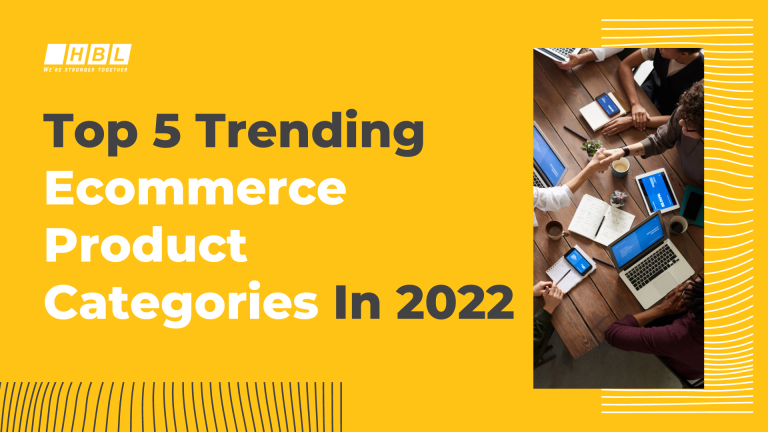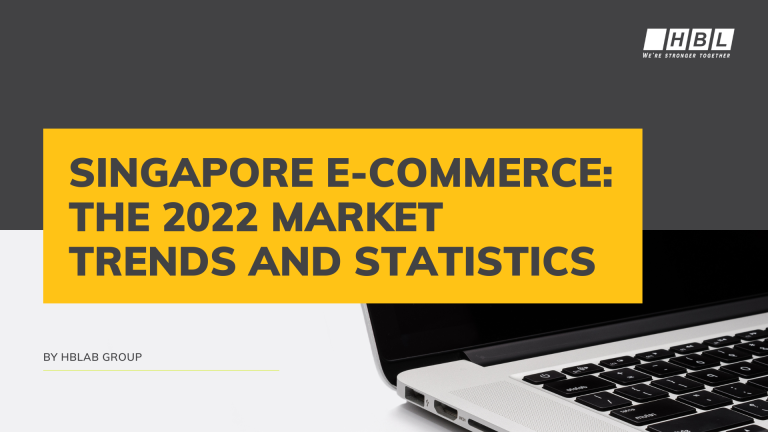In today’s fast-paced digital economy, digital commerce solutions are revolutionizing how businesses deliver seamless, scalable online shopping experiences. With the global ecommerce market projected to reach US$4.96tn by 2030 (Statista), businesses must leverage advanced platforms to stay competitive.
These solutions empower companies to streamline operations, personalize customer experiences, and scale globally, addressing universal challenges like operational efficiency and customer engagement.
This article explores digital commerce solutions, their processes, benefits, and challenges, with a focus on scalability and emerging technologies like AI.
Whether you’re a startup or an enterprise, understanding digital commerce solution development can unlock new growth opportunities.
What Are Digital Commerce Solutions?

Digital commerce solutions refer to platforms and tools that enable businesses to manage online sales, from product browsing to checkout. Gartner defines them as technologies facilitating interactive, self-service, or assisted shopping experiences, integrating product information, pricing, and order management via APIs. These solutions, often delivered as SaaS or PaaS, support ecomm digital solutions for B2B and B2C businesses.
Key components include product information management (PIM), order management, storefronts, and customer analytics. Platforms like Shopify, Adobe Commerce, and VTEX exemplify digital commerce services and solutions, offering scalability and flexibility. For businesses, these solutions simplify complex ecommerce processes, ensuring seamless customer experiences across channels.
How Digital Commerce Solutions Work
Digital Commerce Solutions bring together your storefront, product catalog, inventory, payments, and fulfillment so shoppers can find, buy, and receive products with minimal friction. Modern Digital Commerce Solutions often use headless and composable architecture so you can upgrade parts of the stack without rebuilding everything.
1. Platform Selection
Platform selection in Digital Commerce Solutions focuses on fit and future growth. Teams compare Shopify, BigCommerce, VTEX, CommerceTools, or Adobe Commerce by scalability, cost, ecosystem apps, and API quality.
Headless options give more control over the experience, while strong SLAs and multi-region hosting keep sites fast during traffic spikes. The goal is a platform that matches today’s needs and can scale as orders and channels grow.
2. Integration
Integration is the backbone of Digital Commerce Solutions. APIs and webhooks connect ERP for orders and finance, CRM and CDP for customer data, PIM/MDM for product details, and OMS/WMS for inventory and fulfillment. Real-time sync ensures accurate stock, prices, and order status, while GraphQL and REST speed up data access.
Clean product data, clear taxonomies, and consent-aware profiles make search, merchandising, and personalization work smoothly.
3. Storefront and UX
The storefront experience in Digital Commerce Solutions prioritizes speed, clarity, and accessibility. Headless front ends like Next.js or Hydrogen support server rendering for better Core Web Vitals, while smart search, clear filters, fast product pages, and a streamlined checkout reduce drop-off.
Localization, currency handling, and WCAG compliance make the store inclusive and global-ready, with a mobile-first layout that converts.
4. Personalization and Analytics
Personalization and analytics make Digital Commerce Solutions perform better over time. AI-driven recommendations, segment-based content, and targeted offers increase conversion rate and average order value.
Server-side event tracking and disciplined tagging feed GA4 and ad platforms, while dashboards show what to fix, such as slow pages, search queries with no results, or promotions that do not lift sales.
5. Checkout, Payments, and Taxes
Checkout, payments, and taxes are optimized in Digital Commerce Solutions to raise authorization rates and reduce risk. Payment orchestration supports cards, wallets, and local methods like Afterpay and Klarna, with 3DS2, tokenization, and fraud screening.
Automated tax, duties, and address validation simplify cross-border orders, while smart retries and network tokens recover soft declines.
6. Operations, Security, and SEO
Operations, security, and SEO keep Digital Commerce Solutions stable and discoverable. Autoscaling, CDN edge caching, and image optimization protect performance on peak days. CI/CD, feature flags, and synthetic monitoring allow safe releases and fast rollback. PCI-DSS scope reduction, GDPR/CCPA controls, and WAF/bot protection increase trust.
Technical SEO covers clean URLs, canonicals, hreflang, XML sitemaps, and structured data for products, offers, and reviews.
Example: Shopify for Australia
For example, Digital Commerce Solutions built on Shopify for Australia can use Shop Pay and local payment gateways like Afterpay to match buyer preferences. A mobile-first PWA theme speeds up browsing, while GST settings, Australia Post shipping, and clear delivery promises reduce cart anxiety.
Observability on Shopify API limits, webhook delivery, and ERP/OMS sync keeps orders, refunds, and inventory aligned as you scale.
Leading Global Providers of Digital Commerce Solutions
In the rapidly evolving ecommerce landscape, digital commerce solutions empower businesses to deliver seamless, scalable, and personalized shopping experiences.
Below, we rank the top 10 providers of digital commerce solutions, detailing their technical capabilities, integration strengths, and alignment with ecommerce cloud solutions.
1. Shopify

Shopify, rated 4.5/5 (502 reviews, Gartner), is a leader in digital commerce solutions due to its robust SaaS platform. Its technical strengths include a RESTful API ecosystem supporting over 8,000 apps, GraphQL for efficient data queries, and Liquid templating for customizable storefronts.
Shopify’s serverless architecture ensures 99.99% uptime, auto-scaling for peak traffic, and native integrations with payment gateways like Afterpay and Zip.
It supports ecomm digital solutions for SMBs in 175+ countries, with features like real-time inventory sync and CDN-powered global delivery. Shopify’s developer-friendly SDKs and Webhooks enable rapid digital commerce solution development, making it ideal for fast-growing brands.
2. VTEX
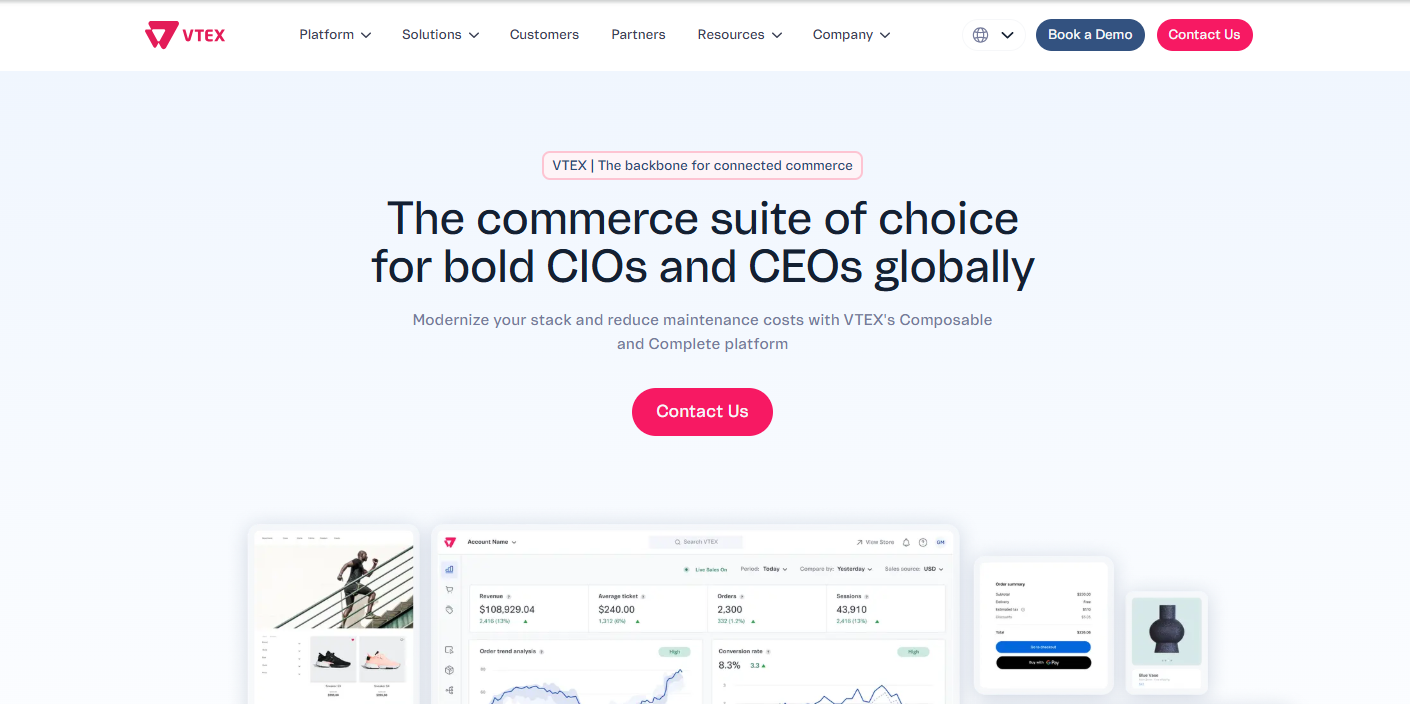
VTEX, with a 4.7/5 rating (263 reviews, Gartner), offers a composable digital commerce services and solutions platform. Its microservices-based architecture leverages GraphQL and REST APIs, enabling modular integrations with ERP, CRM, and third-party systems.
VTEX’s SmartCheckout technology reduces cart abandonment by 20% through one-click payments, while its headless storefront supports React and Node.js frameworks.
With built-in A/B testing and AI-driven personalization, VTEX ensures scalability for enterprises, handling up to 10,000 transactions per second. Its ecommerce cloud solutions include a low-code development platform, accelerating time-to-market by 30%.
3. HBLAB
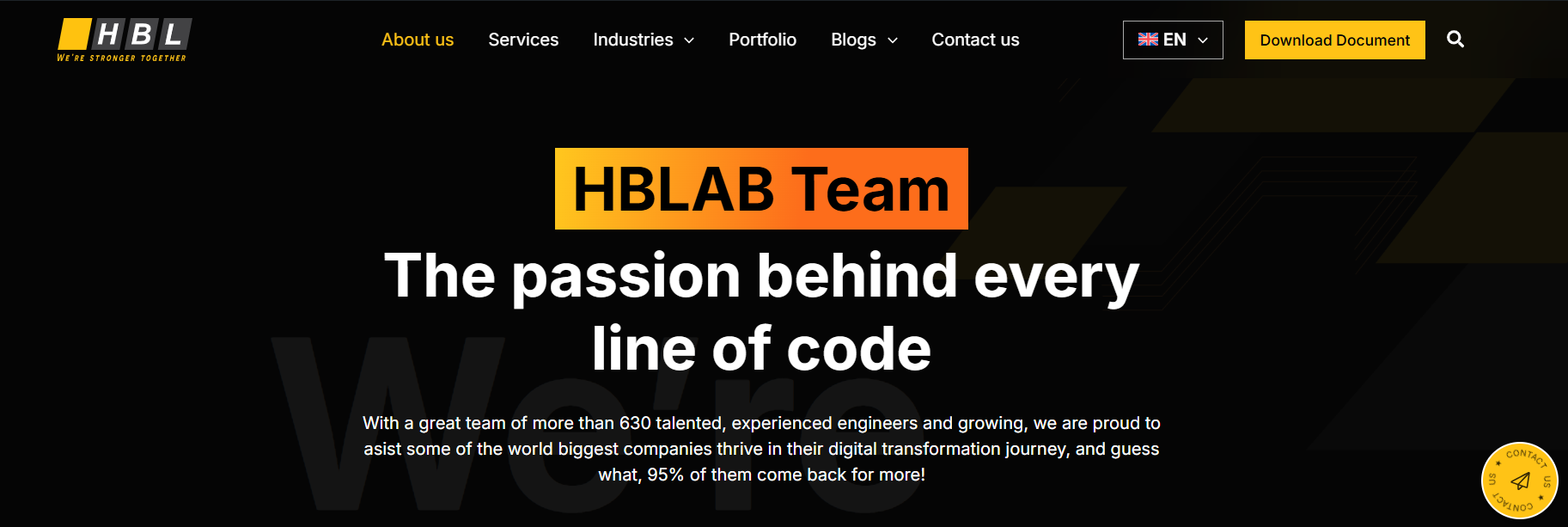
HBLAB is a powerhouse in digital commerce solutions, delivering tailored ecommerce cloud solutions with a focus on AI-driven personalization and cost efficiency. With over 630 professionals, 30% senior-level with 5+ years of experience, HBLAB leverages CMMI Level 3 processes to ensure robust digital commerce solution development.
Its technical expertise includes microservices architectures, REST/GraphQL APIs, and integrations with platforms like Shopify and VTEX.
HBLAB’s AI capabilities, developed since 2017 with partnerships like VNU’s Institute for AI, enable predictive analytics for inventory and personalized recommendations, boosting conversions by up to 25%.
Offering flexible engagement models—offshore, onsite, and dedicated teams—HBLAB delivers solutions 30% cheaper than local rates, with enterprise-grade security via ISO 27001 compliance.
4. Adobe Commerce
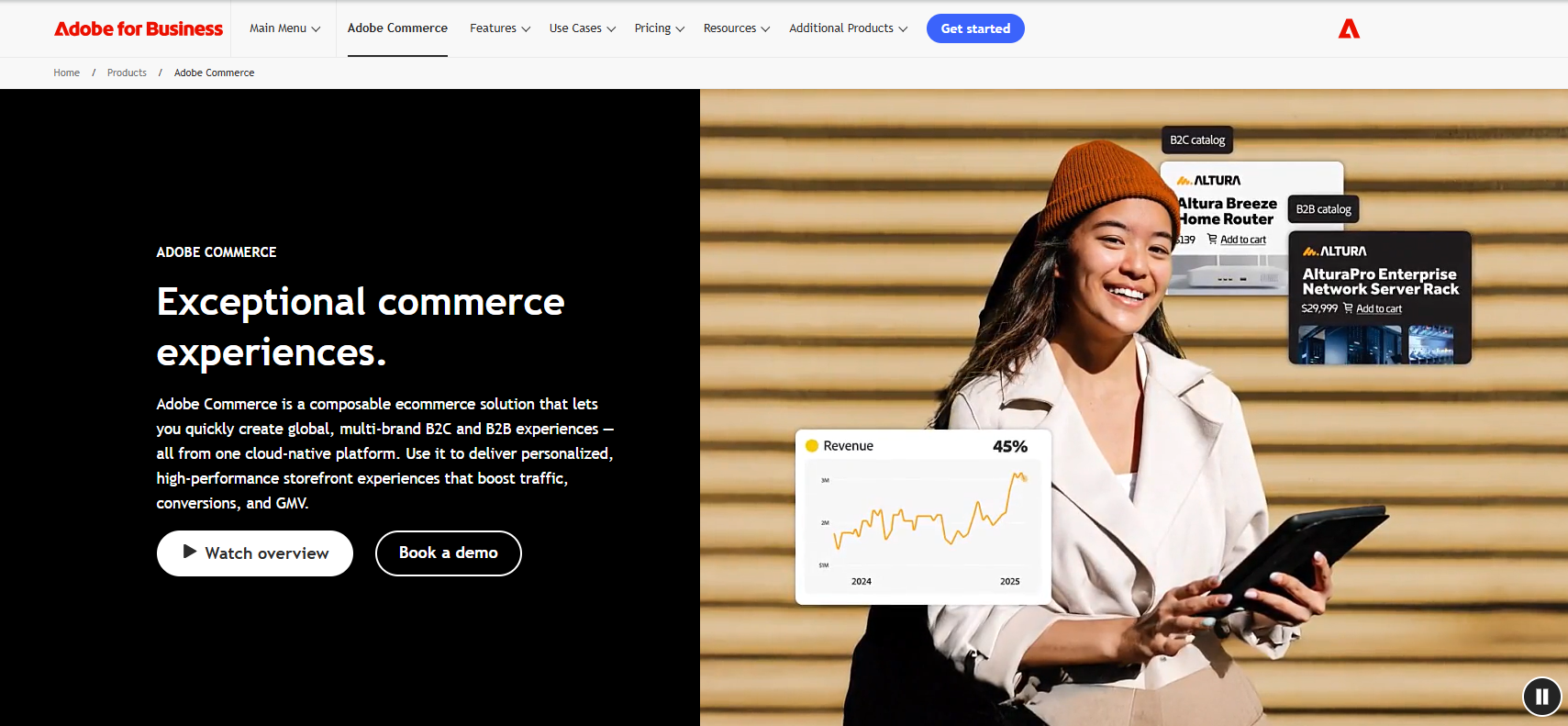
Adobe Commerce, rated 4.4/5 (348 reviews, Gartner), excels in digital commerce solutions with its cloud-native architecture. Built on PHP and Magento’s open-source core, it supports REST and GraphQL APIs for seamless ERP/CRM integrations.
Its Adobe Sensei AI engine delivers personalized product recommendations and dynamic pricing, while ElasticSearch powers fast, faceted search.
Adobe Commerce handles 1 million+ SKUs with 99.98% uptime, ideal for enterprises needing ecommerce digital solutions. Its integration with Adobe Experience Manager ensures unified content and commerce, with Sydney-based support enhancing Asia-Pacific deployments.
5. BigCommerce
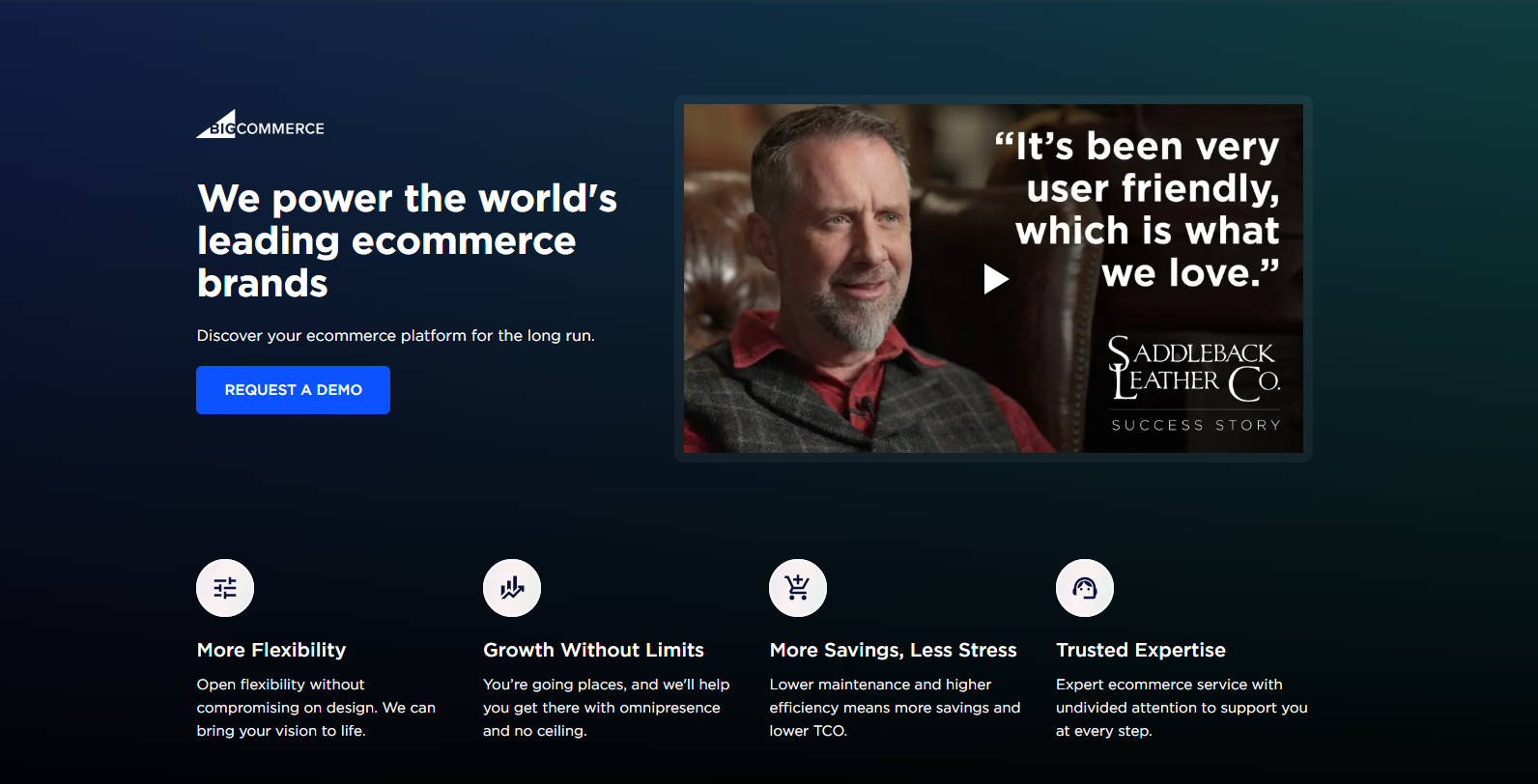
BigCommerce, rated 4.3/5 (174 reviews, Gartner), combines SaaS simplicity with headless flexibility for digital commerce services and solutions.
Its Stencil CLI and GraphQL Storefront API enable custom frontends using React or Vue.js, while REST APIs integrate with SAP and NetSuite. BigCommerce supports multicurrency and region-specific tax calculations, processing 5,000+ orders per minute.
Its ecommerce cloud solutions include built-in SEO tools and AMP support, improving page load times by 50%. Localized support in Australia makes it a strong choice for global expansion.
6. Salesforce Commerce Cloud
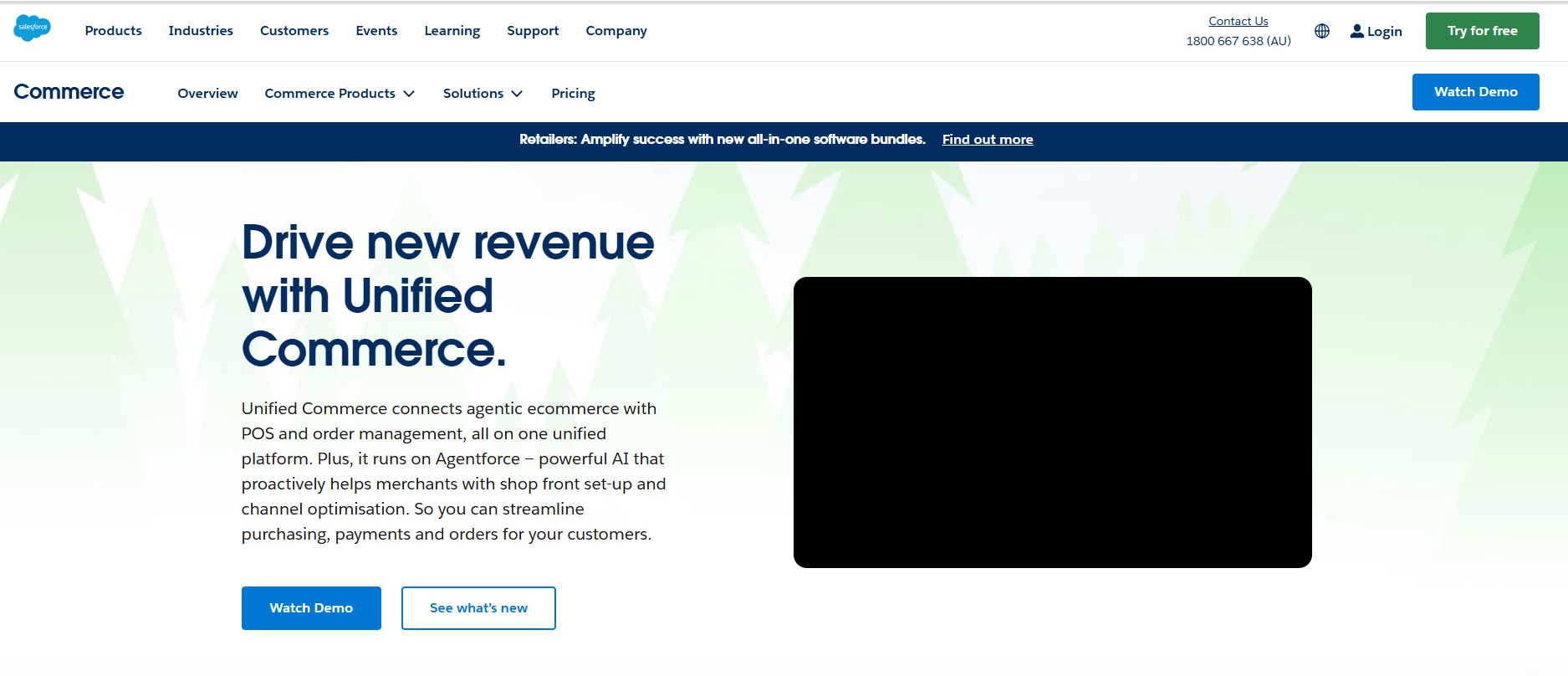
Salesforce, with a 4.5/5 rating (111 reviews for B2C, 57 for B2B, Gartner), integrates AI (Einstein) into its digital commerce solutions for predictive analytics and hyper-personalization.
Its RESTful APIs and Salesforce CLI support integrations with Salesforce CRM and third-party systems like SAP. The platform’s headless commerce kit, built on Node.js, ensures flexible frontends, while its scalability handles 10 million+ monthly visits.
Salesforce’s ecomm digital solutions excel in omnichannel experiences, with 360-degree customer views driving 63% higher conversions (YETI case study).
7. commercetools
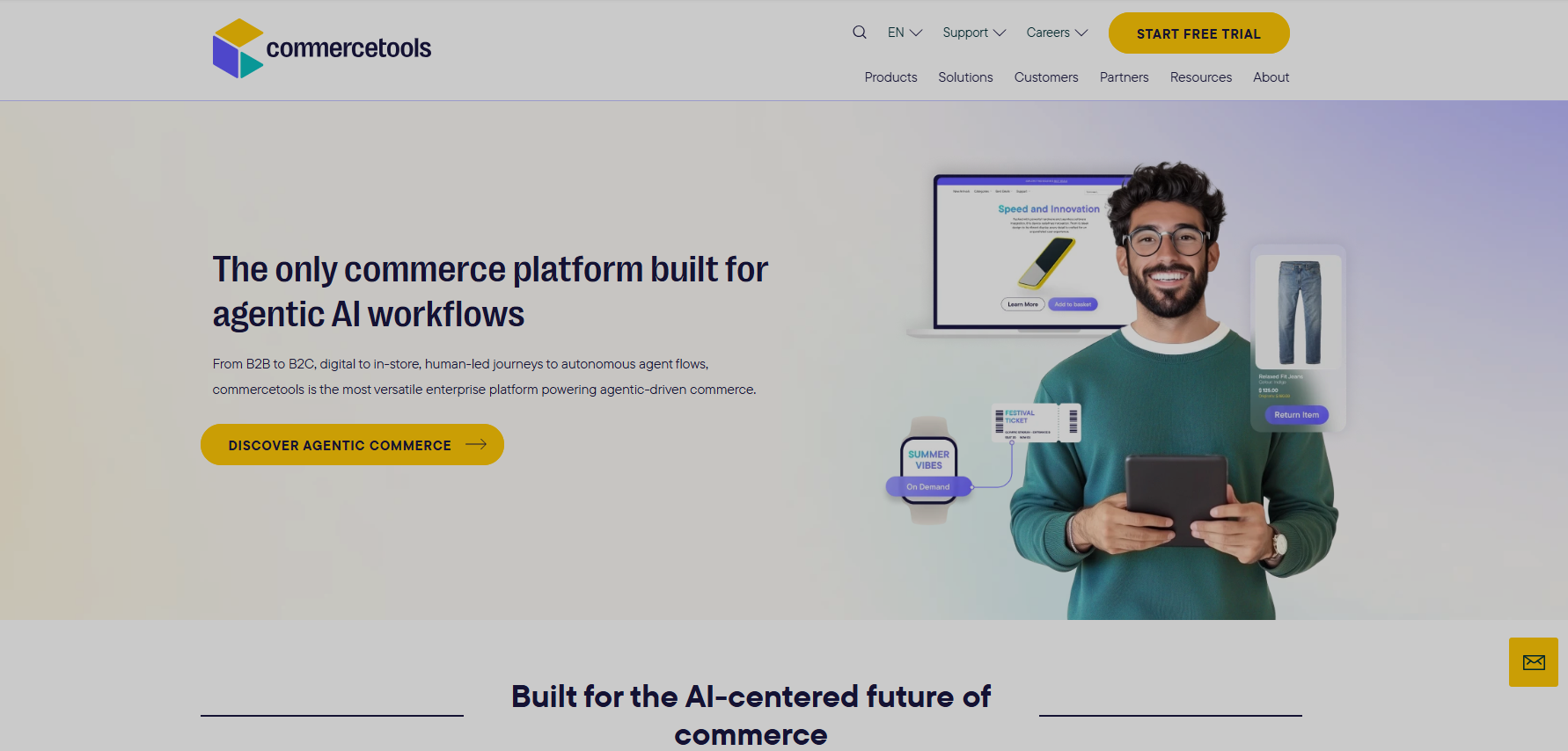
commercetools, rated 4.6/5 (64 reviews, Gartner), pioneered headless digital commerce solutions.
Its API-first, microservices architecture supports 300+ APIs, enabling integrations with IoT devices and AR/VR platforms.
Built on MACH principles (Microservices, API-first, Cloud-native, Headless), it offers 99.99% uptime and processes 500,000 requests per minute. commercetools’ ecommerce cloud solutions support dynamic pricing and real-time inventory, ideal for innovative digital commerce solution development.
8. Spryker
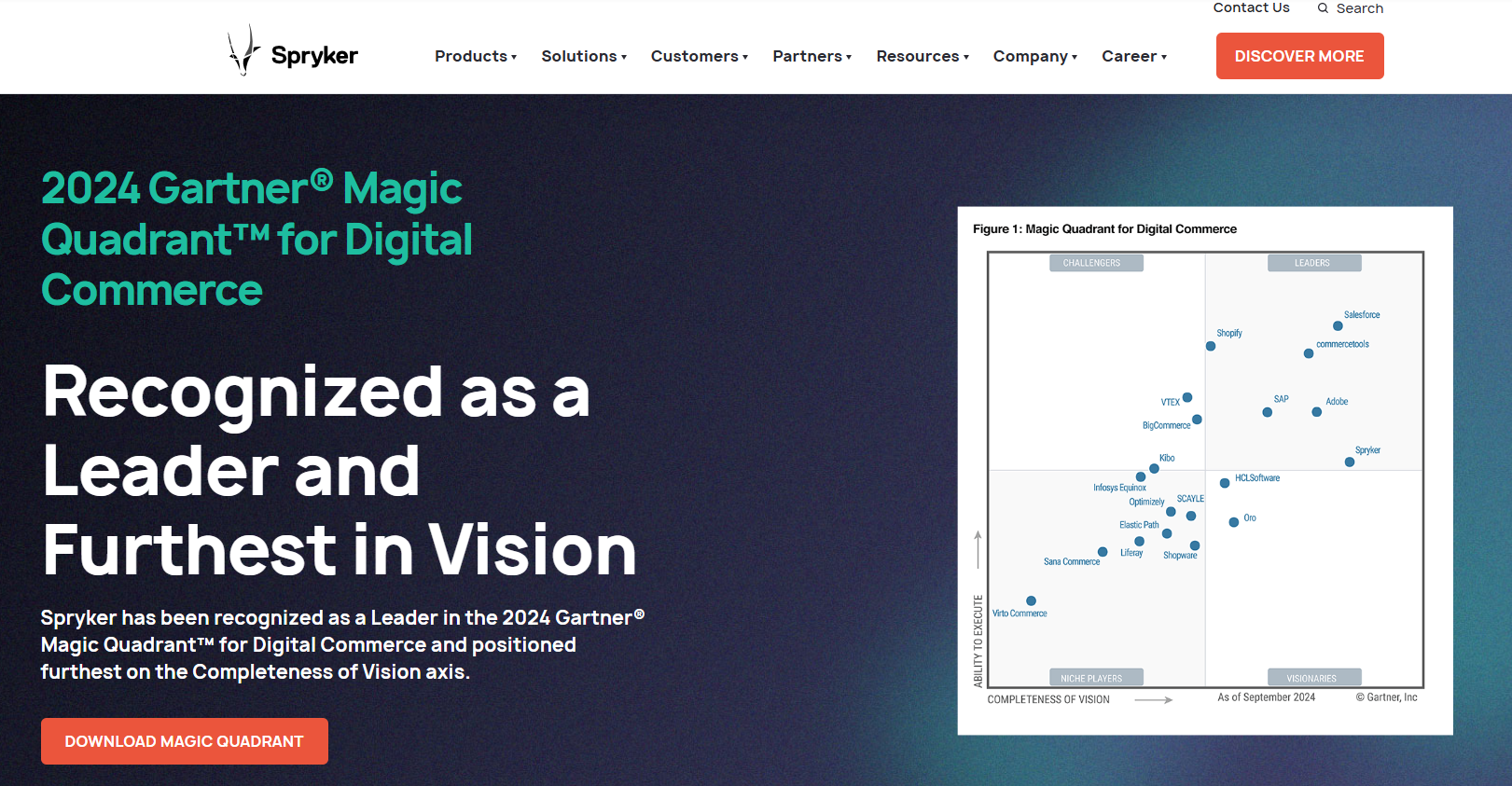
Spryker, rated 4.3/5 (110 reviews, Gartner), is a headless, API-first platform for digital commerce services and solutions. Its modular architecture, built on PHP and Symfony, supports 70+ pre-built capabilities, including PIM and OMS.
Spryker’s GraphQL APIs enable integrations with SAP and Dynamics 365, while its state machine optimizes complex B2B workflows.
With 99.95% uptime, Spryker is suited for enterprises seeking ecomm digital solutions with rapid deployment.
9. Elastic Path
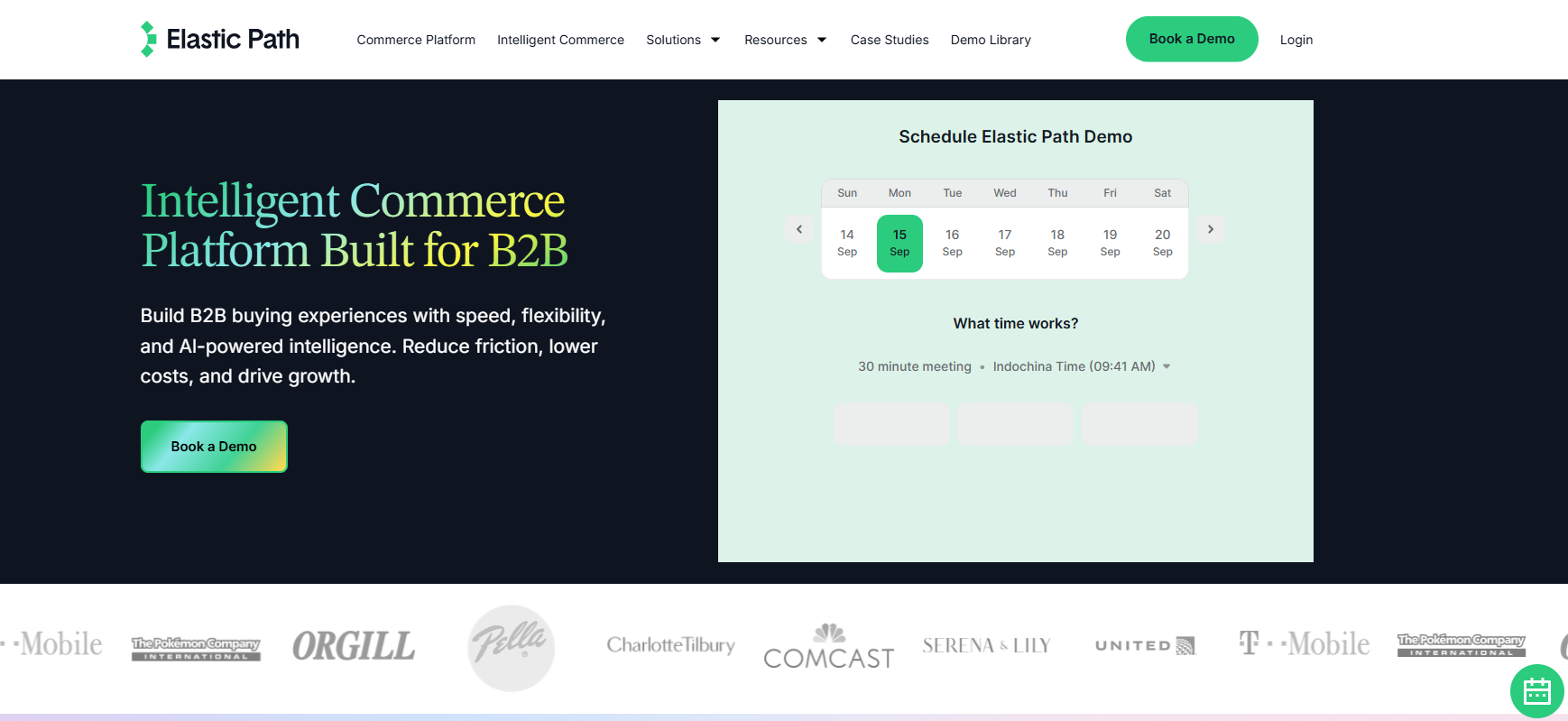
Elastic Path, rated 4.6/5 (96 reviews, Gartner), focuses on composable digital commerce solutions. Its Commerce Cloud leverages REST APIs and a low-code SDK, supporting integrations with Stripe and SAP. Elastic Path’s Experience Manager enables dynamic content orchestration, while its event-driven architecture handles 1,000+ transactions per second.
This makes it a top choice for ecommerce cloud solutions prioritizing flexibility and speed.
10. SCAYLE
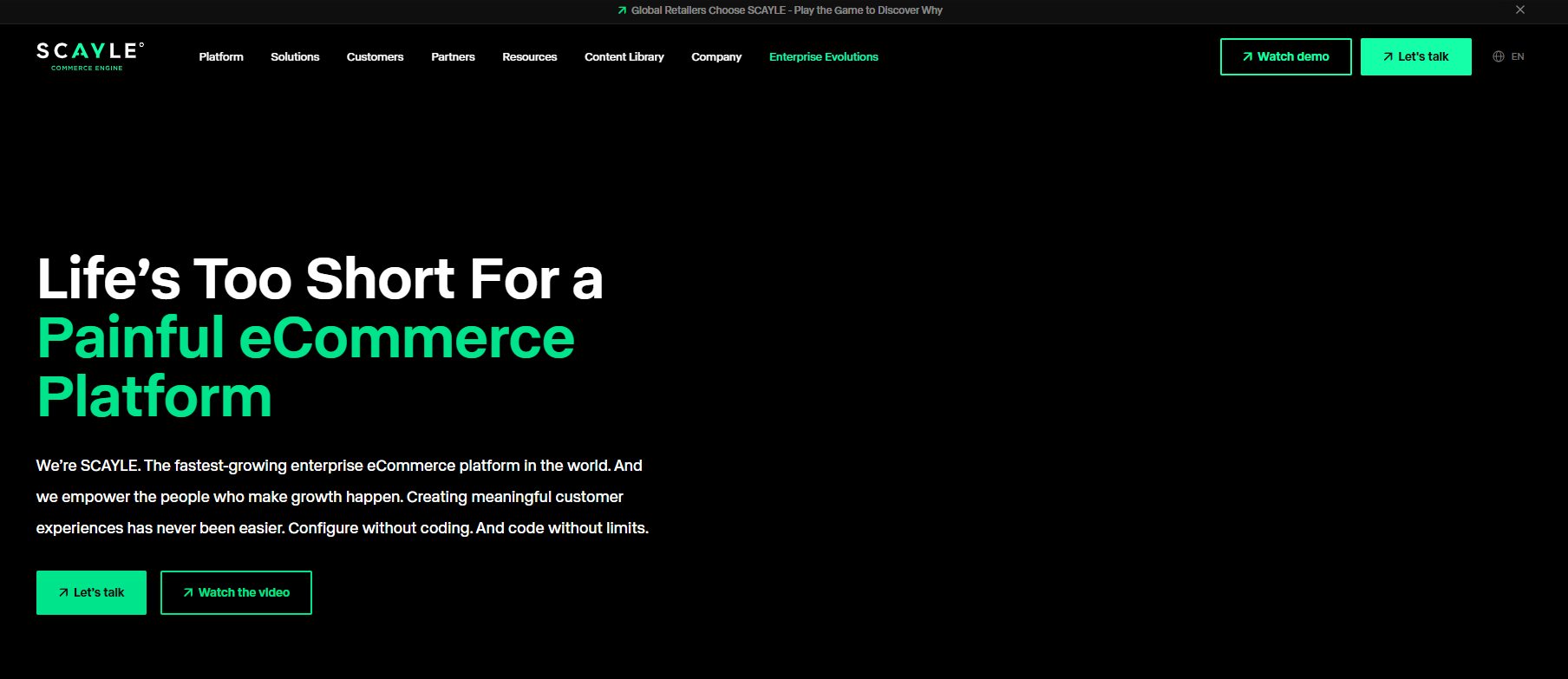
SCAYLE, rated 4.9/5 (45 reviews, Gartner), delivers enterprise-grade digital commerce solutions with a unified interface for PIM, OMS, and checkout. Its GraphQL and REST APIs support integrations with Salesforce and SAP, while its MACH-compliant architecture ensures 99.98% uptime.
SCAYLE’s AI-driven search and merchandising tools enhance ecomm digital solutions, making it ideal for B2C retailers seeking omnichannel excellence.
These providers drive innovation in digital commerce solutions, leveraging advanced APIs, AI, and headless architectures to meet global ecommerce demands.
HBLAB’s expertise in digital commerce solution development, combined with its AI-driven and cost-effective approach, positions it as a leader in this space.
Advantages of Digital Commerce Solutions
Digital commerce solutions offer transformative benefits for businesses aiming to scale and enhance customer experiences. Here are the key advantages:
- Scalability: Platforms like BigCommerce and VTEX auto-scale during peak traffic, ensuring uninterrupted service.
- Cost Efficiency: SaaS models reduce upfront costs, with HBLAB offering cost-effective IT solutions 30% lower than local rates.
- Personalization: AI-driven analytics enable tailored shopping experiences, increasing conversions by up to 63% (Salesforce case study: YETI).
- Global Reach: Solutions support multicurrency and localized tax settings, simplifying international expansion.
- Streamlined Operations: Integration with ERP and CRM systems automates inventory and order management, saving time.
These benefits make digital commerce services and solutions essential for businesses seeking agility and growth. 👉 Explore HBLAB’s expertise in scalable ecommerce platforms!
Challenges and Risks of Digital Commerce Solutions
While powerful, digital commerce solutions come with challenges that businesses must address:
- Integration Complexity: Connecting platforms with legacy systems can be time-consuming and costly. HBLAB’s expertise in ecommerce cloud solutions mitigates this risk.
- Security Concerns: Handling sensitive customer data requires robust safeguards. Platforms like Oracle Commerce offer enterprise-grade security.
- High Initial Setup Costs: Customizations for digital commerce solution development may require significant investment.
- Vendor Lock-In: Some platforms limit flexibility, making migrations challenging.
Proactive planning and choosing flexible platforms like Spryker or commercetools can minimize these risks, ensuring long-term success.
Role of Emerging Technologies in Digital Commerce Solutions
Emerging technologies power faster, smarter, and more flexible Digital Commerce Solutions by improving discovery, personalization, performance, and agility across the entire buying journey. They help businesses adapt quickly while maintaining consistent, high-quality customer experiences.

AI and ML
AI turns Digital Commerce Solutions into learning systems that improve with every interaction. Product recommendations, personalized content, and dynamic search results increase relevance and conversion, while AI in Adobe Commerce and similar platforms analyzes behavior to create tailored journeys. Machine learning also supports demand forecasting, fraud detection, and pricing optimization, making merchandising and promotions more effective with less manual effort.
Headless Commerce
Headless decouples the storefront from the commerce engine so Digital Commerce Solutions can evolve without risky rebuilds. With commercetools or headless-ready platforms, teams can redesign the front end, launch new channels, and run A/B tests independently from back-end logic. This separation accelerates releases, improves site speed, and supports omnichannel use cases like mobile apps, kiosks, and marketplaces using the same core services.
Composable Architecture
Composable design lets Digital Commerce Solutions assemble best-of-breed services—PIM, search, CMS, payments, and fulfillment—around a stable core. VTEX’s composable approach enables rapid swaps or upgrades without downtime, so brands can add capabilities like subscriptions, buy-online-pickup-in-store, or cross-border taxes as they grow. This keeps total cost of ownership predictable and reduces vendor lock-in.
Edge Performance
Running Digital Commerce Solutions on edge networks and CDNs shortens load times, which boosts SEO and conversions. Server-side rendering, image optimization, and caching at the edge deliver fast product and checkout pages globally. Faster sites also reduce bounce rates on mobile, where most ecommerce traffic now originates.
Data and Privacy
Modern Digital Commerce Solutions unify customer, product, and order data through APIs and event streams while respecting privacy. Clean product data and consent-aware profiles improve on-site search and personalization, and secure integrations with ERP, OMS, CRM, and CDP keep stock, pricing, and promotions accurate in real time.
With Australia’s ecommerce market projected to grow to US$46.51bn by 2030, Digital Commerce Solutions that adopt AI, headless, and composable architecture are better positioned to capture demand.
When to Use Digital Commerce Solutions?
Digital commerce solutions excel in specific scenarios:
- Rapid Scaling: Platforms like BigCommerce support businesses during high-growth phases, handling peak demand effortlessly.
- Global Expansion: Solutions with multicurrency and localization features are ideal for entering new markets.
- Complex B2B Needs: Sana Commerce’s B2B-focused platform streamlines complex processes like bulk ordering.
- Personalized Experiences: AI-driven platforms like Adobe Commerce are perfect for brands prioritizing tailored customer journeys.
Choosing the right solution depends on your business goals and technical requirements. HBLAB’s expertise ensures seamless implementation. 👉 Get started with HBLAB’s digital commerce services!
HBLAB – Your Partner in Digital Commerce Solutions
HBLAB is a trusted partner in digital commerce solutions, empowering businesses to scale and innovate in the global ecommerce landscape. With over 630 professionals, 30% of whom are senior-level experts with 5+ years of experience, HBLAB delivers tailored ecommerce cloud solutions that drive results. Our CMMI Level 3 certification ensures process excellence, while our AI expertise since 2017, backed by partnerships like VNU’s Institute for AI, enables cutting-edge personalization and automation.

Our flexible engagement models—offshore, onsite, and dedicated teams—offer cost efficiency, with rates up to 30% lower than local markets. From platform selection to API integration and headless storefront development, HBLAB streamlines digital commerce solution development for startups and enterprises alike. Our global presence and English-proficient team ensure seamless collaboration, delivering secure, scalable solutions that align with your business goals.
Conclusion
Digital commerce solutions are critical for businesses aiming to thrive. From scalability and personalization to global expansion, these platforms address universal challenges while leveraging AI and headless architecture for innovation. Despite challenges like integration complexity, HBLAB’s expertise ensures seamless implementation and measurable results. Embrace digital commerce solutions to unlock growth and stay competitive.
CONTACT US FOR A FREE CONSULTATION!
FAQ
1. What is a digital commerce solution?
A digital commerce solution is a platform enabling businesses to manage online sales, integrating product information, order management, and customer analytics for seamless shopping experiences.
2. How do digital commerce solutions benefit businesses?
They offer scalability, cost efficiency, and personalized experiences, boosting conversions and streamlining operations with ecommerce cloud solutions.
3. What are the challenges of digital commerce solutions?
Integration complexity, security concerns, and high setup costs are common risks, mitigated by choosing flexible platforms and expert partners like HBLAB.
4. How does AI enhance digital commerce solutions?
AI drives personalization, optimizes product recommendations, and automates processes, improving efficiency in AI-driven IT services.
5. When should businesses adopt digital commerce solutions?
Adopt them for rapid scaling, global expansion, or complex B2B needs, leveraging platforms like VTEX for digital commerce services and solutions.
6. Why choose HBLAB for digital commerce solutions?
HBLAB’s 630+ professionals, CMMI Level 3 certification, and AI expertise deliver cost-effective, scalable ecomm digital solutions tailored to your needs.
7. How do headless ecommerce solutions work?
Headless solutions separate front-end and back-end systems, enabling flexible updates and seamless integrations for digital commerce solution development.
CONTACT US FOR A FREE CONSULTATION
Read more:
– No-Code Test Automation: The Ultimate Success Blueprint
– Mastering IT Vendor Management: Dominate Smarter, Stronger Tech Alliances
– Mastering IT Communications Strategy : Importance, Implementation, and Best Practices


